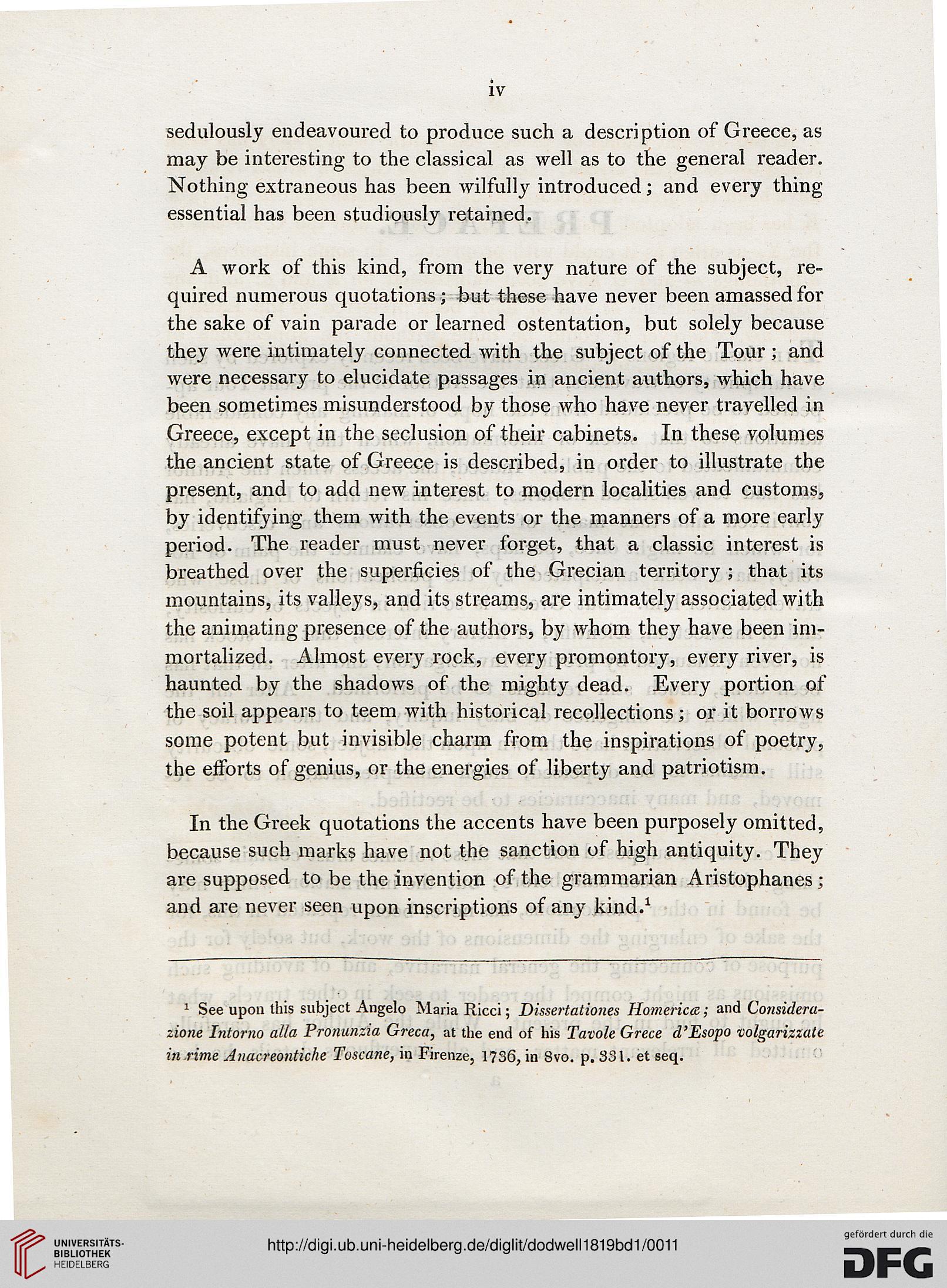IV
sedulously endeavoured to produce such a description of Greece, as
may be interesting to the classical as well as to the general reader.
Nothing extraneous has been wilfully introduced; and every thing
essential has been studiously retained.
A work of this kind, from the very nature of the subject, re-
quired numerous quotations; but these have never been amassed for
the sake of vain parade or learned ostentation, but solely because
they were intimately connected with the subject of the Tour ; and
were necessary to elucidate passages in ancient authors, which have
been sometimes misunderstood by those who have never travelled in
Greece, except in the seclusion of their cabinets. In these volumes
the ancient state of Greece is described, in order to illustrate the
present, and to add new interest to modern localities and customs,
by identifying them with the events or the manners of a more early
period. The reader must never forget, that a classic interest is
breathed over the superficies of the Grecian territory ; that its
mountains, its valleys, and its streams, are intimately associated with
the animating presence of the authors, by whom they have been im-
mortalized. Almost every rock, every promontory, every river, is
haunted by the shadows of the mighty dead. Every portion of
the soil appears to teem with historical recollections; or it borrows
some potent but invisible charm from the inspirations of poetry,
the efforts of genius, or the energies of liberty and patriotism.
In the Greek quotations the accents have been purposely omitted,
because such marks have not the sanction of high antiquity. They
are supposed to be the invention of the grammarian Aristophanes;
and are never seen upon inscriptions of any kind.1
1 See upon this subject Angelo Maria Ricci; Dissertationes Homerica; and Considera-
zione Intorno alia Pronunzia Greca, at the end of his Tavole Grece d'Esopo volgarizzale
in.rime dnacreontiche Toscane, in Firenze, 1736, in 8vo. p. 331. et seq.
sedulously endeavoured to produce such a description of Greece, as
may be interesting to the classical as well as to the general reader.
Nothing extraneous has been wilfully introduced; and every thing
essential has been studiously retained.
A work of this kind, from the very nature of the subject, re-
quired numerous quotations; but these have never been amassed for
the sake of vain parade or learned ostentation, but solely because
they were intimately connected with the subject of the Tour ; and
were necessary to elucidate passages in ancient authors, which have
been sometimes misunderstood by those who have never travelled in
Greece, except in the seclusion of their cabinets. In these volumes
the ancient state of Greece is described, in order to illustrate the
present, and to add new interest to modern localities and customs,
by identifying them with the events or the manners of a more early
period. The reader must never forget, that a classic interest is
breathed over the superficies of the Grecian territory ; that its
mountains, its valleys, and its streams, are intimately associated with
the animating presence of the authors, by whom they have been im-
mortalized. Almost every rock, every promontory, every river, is
haunted by the shadows of the mighty dead. Every portion of
the soil appears to teem with historical recollections; or it borrows
some potent but invisible charm from the inspirations of poetry,
the efforts of genius, or the energies of liberty and patriotism.
In the Greek quotations the accents have been purposely omitted,
because such marks have not the sanction of high antiquity. They
are supposed to be the invention of the grammarian Aristophanes;
and are never seen upon inscriptions of any kind.1
1 See upon this subject Angelo Maria Ricci; Dissertationes Homerica; and Considera-
zione Intorno alia Pronunzia Greca, at the end of his Tavole Grece d'Esopo volgarizzale
in.rime dnacreontiche Toscane, in Firenze, 1736, in 8vo. p. 331. et seq.




